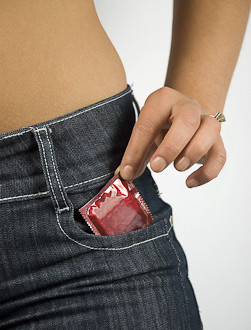 This article is designed to be a quick summary HIV information, especially as it relates to swinging. It is not all-encompassing or designed to be specific medical advice. My goal is to share basic facts to help you maximize your safety while having recreational sex.
This article is designed to be a quick summary HIV information, especially as it relates to swinging. It is not all-encompassing or designed to be specific medical advice. My goal is to share basic facts to help you maximize your safety while having recreational sex.
Human Immunodeficiency Virus is the virus that causes AIDS (Acquired Immune Deficiency Syndrome). The virus kills specific cells in the immune system which are crucial to fighting disease. HIV/AIDS is treatable, but cannot be cured. For most people it will reduce their lifespan and significantly affect their quality of life.
HIV is found in significant amounts in blood, semen and vaginal fluids. It is a very fragile virus and can't survive outside the body. HIV is spread through sex without condoms. Anal sex is most risky especially for the receiver, vaginal sex caries significant risk especially for women, while oral sex carries a lower risk. HIV is also spread by IV drug users sharing needles.
Incidence:
More than 1.1 million people in the US have HIV, nearly 1 in 5 are unaware that they are infected. Men who have sex with men account for 63% of new cases. Heterosexuals account for 25% of new cases. A larger percentage of black and Hispanic people are affected by HIV, but overall since there are more white people in the US there are more white people with HIV.
Testing:
The standard HIV test is an antibody blood test. The time it takes after the initial infection for the test to become positive varies from person to person. The average is 25 days, but for some people it may take up to 3 months. Therefore a standard HIV test is a snapshot of your infection status 3 months ago. The newer RNA test can show a positive test within 11 days. The RNA test is more expensive and not widely available.
If you have any form of unprotected sex with multiple or anonymous partners you should be tested yearly for HIV.
Treatment:
HIV can be treated with medications. The medications are expensive and cause significant side effects. Treatment prolongs life and reduces the amount of virus in the body. This helps to decrease the contagiousness of the disease.
Prevention:
Of course the best was to prevent HIV is to not have sex or to be monogamous with someone who has been tested.
Condoms provide very effective protection against HIV transmission. The spermicide, nonoxynol-9 should not be used because it damages mucous membranes and increases HIV transmission. For more information about condoms, see my article Condoms are Sexy. Infection with other STD's increases the rate of transmission of HIV. You should be tested and treated for other STD's to help reduce your risk of contracting HIV.
HIV resources: http://www.cdc.gov/hiv/ http://www.webmd.com/hiv-aids/default.htm

